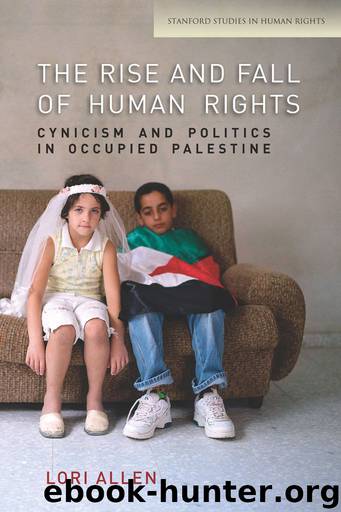The Rise and Fall of Human Rights: Cynicism and Politics in Occupied Palestine (Stanford Studies in Human Rights) by Allen Lori

Author:Allen, Lori [Allen, Lori]
Language: eng
Format: epub
Publisher: Stanford University Press
Published: 2013-04-24T00:00:00+00:00
Chapter 4
Making Up the Face of the State
Human Rights in the Creation of Political Authority
During a discussion I had in 2009 with a Palestinian UN worker, Bashir, who is involved in human rights training for PA security personnel, recalled with amusement a telling exchange he once had with a civilian police director:
One time the head of police in the West Bank and Gaza Strip said to me—this is the top security officer in the police—he said, “I don’t send my cadre to your training because of you or because of human rights, but for my reports to the Europeans.” He said, “As director of police I do respect human rights, but I want cars and arms. I want something out of this.” He told me this straight out!
According to Bashir’s analysis of the exchange, PA security personnel consider human rights to be something like makeup for a face that they present. It is a performance used “to send a message to the international community that we respect human rights and we deserve a state,” not something related to their actual behavior or rules. Bashir, the police chief, and other trainers recognize the instrumental deployment of human rights discourse and activities. All these actors understand that they “do human rights” in order to get foreign goodies, and to demonstrate “stateness” through the illusion of complying with the codes of conduct expected of states. Much of the PA budget relies on donor funds, so if the donors are worried about PA rights violations, so is the PA.
The incorporation of human rights routines, rituals, and displays into a government’s apparatus has become standard practice for most states (excepting those willing to suffer the label of “rogue”). The rights regime (including its professed values, institutions, actors, and practices), and law more generally, shapes subjectivities and political claim-making in Palestine (Allen 2009a; Fassin 2008; Feldman 2008; Kelly 2006), as elsewhere. From Colombia to Iran, the United Kingdom, and beyond (Kelly 2012; Merry 2011; Osanloo 2009; Tate 2007), the human rights system has become a central element of the conception of state legitimacy. It is necessary window dressing that is hung to prettify, and sometimes to block the view of what is really happening inside, where, in the Palestinian case, the pseudo-state is committing a range of abuses.1
A variety of actors take part in the performance of human rights and of the state in the West Bank, including PA security services and the Independent Commission for Human Rights (ICHR), the quasi-state human rights organization that monitors the PA. The United States and Israel make the loudest demands of the PA for “law and order” of a particular sort, one that tolerates and even encourages human rights violations in the West Bank PA’s pursuit of political dominance,2 but it also includes international donors who support the human rights system. The West Bank PA has hinged the production of its own stateness on distinguishing itself as a state and defining its relationship to society through two key performances
Download
This site does not store any files on its server. We only index and link to content provided by other sites. Please contact the content providers to delete copyright contents if any and email us, we'll remove relevant links or contents immediately.
| Anthropology | Archaeology |
| Philosophy | Politics & Government |
| Social Sciences | Sociology |
| Women's Studies |
The Secret History by Donna Tartt(16624)
The Social Justice Warrior Handbook by Lisa De Pasquale(11489)
Thirteen Reasons Why by Jay Asher(7788)
This Is How You Lose Her by Junot Diaz(5773)
Weapons of Math Destruction by Cathy O'Neil(5037)
Zero to One by Peter Thiel(4824)
The Myth of the Strong Leader by Archie Brown(4789)
Promise Me, Dad by Joe Biden(4447)
Beartown by Fredrik Backman(4419)
Stone's Rules by Roger Stone(4416)
How Democracies Die by Steven Levitsky & Daniel Ziblatt(4399)
The Fire Next Time by James Baldwin(4343)
100 Deadly Skills by Clint Emerson(4079)
A Higher Loyalty: Truth, Lies, and Leadership by James Comey(4033)
Rise and Kill First by Ronen Bergman(4012)
The David Icke Guide to the Global Conspiracy (and how to end it) by David Icke(3883)
The Farm by Tom Rob Smith(3872)
Secrecy World by Jake Bernstein(3783)
The Doomsday Machine by Daniel Ellsberg(3731)
